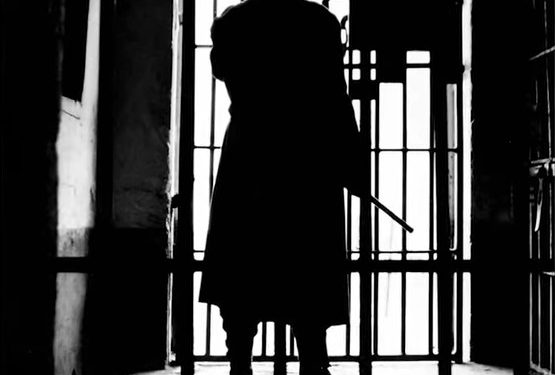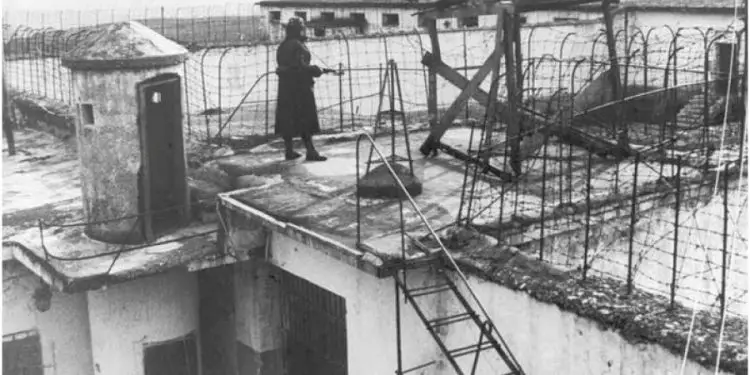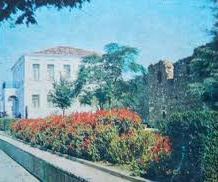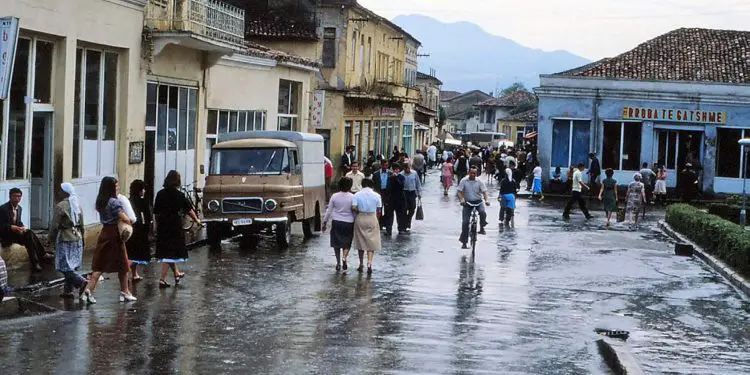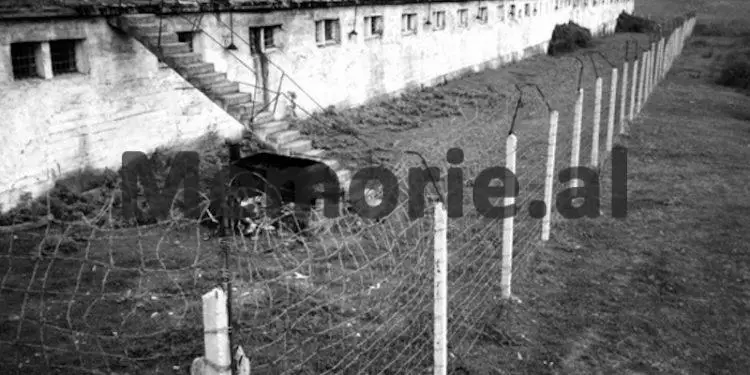Dashnor Kaloçi
The fourth part
Memorie.al/publishes the unknown story of Jetullah Gashi, originally from the village of Mramor in Prishtina, who in 1964, when he was a high school student, decided to flee and cross the state border in the area of the village of Zogaj in the district of Tropoja, where for several days, interrogating him in the Internal Affairs Branch of the city “Bajram Curri”, they brought him to the town of Shijak, placing him in a State Security base, which was called “The filtering center of Kosovar emigrants”, who were fleeing Yugoslavia and coming to Albania, where for several months he was subjected to intensive investigation by State Security officers coming from the Ministry of Internal Affairs and covering “Kosovo emigration”.
He was sent to the district of Korça where he finished high school in the town of Maliq and then in Tirana, where he attended higher university studies at the Faculty of Medicine, which he completed in 1971 and was appointed in Elbasan as a nearby doctor. the hospital of that city. His arrest in 1977 after some time of surveillance and persecution by the State Security organs, “as an agent of the UDB”, where after several months of inhuman torture, he was sentenced to 25 years in political prison, which suffered in the camps of Spaç, Qafë-Barit, Burrel, etc., the extraordinary gesture of Jetullah Gashi when he was serving his sentence, handing over the white shirt of the doctor and working in shifts in the gallery of Spaç, from where he was released at the beginning of 1991, with the overthrow of the communist regime.
It was August 30, 1964, when I, after cutting the train ticket from Prishtina to Skopje (where I was working with my father), all the way, I was just thinking how I would get to Albania, which I had been grinding for so many days. in head. At that time, I did not have any information about the state border, Yugoslavia – Albania and based on this fact, I went to the bus station in Skopje, where I cut the bus ticket to Gjakova and arrived there in the late hours of the night. I got off the bus and did not know where to go, as I had never been to Gjakova. I made every effort to avoid people and took the road that had less traffic. At the end of this road, I saw a bakery, bought some buns and continued the same road direction in the dark of night. On the right side of the road, I saw a fence, which I crossed and entered the garden. I decided to sleep there. Near the siege, I found a safe place that protected me, as occasionally there was dog barking, but after a while they ceased. Tired I had fallen asleep. I woke up in the morning, after looking around the place, got up, crossed the fence and went out on the street again. My cousin Kadriu had told me that the border to Albania crosses the tops of some bare hills “. This is how 75-year-old Jetullah Gashi from Kosovo remembers the moment of his escape from Yugoslavia to Albania, where he was arrested after graduating from the Faculty of Medicine in Tirana and serving as a doctor for several years in the hospital of the city of Elbasan, in April 1977. by the State Security, being charged as a “UDB agent” and sentenced to 25 years in prison. Torture during the investigation and the sentence of 25 years in prison, the long ordeal in the camps and prisons of the communist regime of Enver Hoxha until the beginning of 1991, being released with the last convicts who came out of the “communist hell”, leaving for Switzerland to his relatives, returning to Albania and finally leaving for Kosovo, where he still lives with his family. Regarding these and other events and facts from his painful life, doctor Jetullah Gashi, testifies exclusively for Memorie.al
Continued from the previous issue
Mr. Jetullah, what was your trial when it took place and how do you remember it?
On June 12, 1978, I was taken from a dreadful dungeon and taken to court. I was horrified when I saw there in court, Flutura Bajrami with her three friends! As it is possible, I said to myself, during the entire intensive investigation, which was done by the three investigators, only two or three times the Chairman of the Internal Affairs Branch, Gëzim Hila, assisted, to whom in the presence of the investigators, I said: “There is nothing indeed, in your accusations. You are following the orders of Lirim Pëllumbi and Shaban Braha, and the mayor Gëzim Hila, with his investigators, are destroying four Elbasan families”!?
Was your trial public, or behind closed doors?
The trial was held behind closed doors and continued for three days in a row, on June 12, 13 and 14, 1978. The court was filled with investigators and various State Security officers, who stood like wild beasts, above us the defendants. On the first and second day, the trial panel and the prosecutor dealt with the detainees, where they brought to Flutura two witnesses, who had allegedly had hostile conversations with them. In the questions that the prosecutor asked me, I addressed Flutura, begging him not to be afraid, and to tell the truth as it was, and not what the investigator Zeqir Maçka owed. I addressed the executioner Zeqir, saying: ‘Tell the Trial Panel of the Prosecutor, who caused these wounds on my hands’, and I pointed my hands at the trial panel, to look at the wounds caused. Zeqiri took two pieces of paper from his pocket, which he showed to the court as evidence. I stood up and objected, telling them that they are forged, that it is not my writing, but it is your manipulations. But the Prosecutor intervened and addressed me in a threatening tone: “Defendant, say yes or no, that we know that the Yugoslav UDB has its agents all over the world, so we can even shoot you…
Feeling afraid that you might be sentenced to be shot?
After what the prosecutor, Hysniu, stated, I addressed you and said: ‘You also know, Hysni, that there is nothing real here, you have communicated to me the accusation of “agitation and propaganda” and you, after five – six months, You communicated the accusation to me as an “agent and traitor to the homeland” !? All this, you have done with the orders of those who are here, who have left nothing undone to me, to make white black and black white. “Time will prove that Lirim Pëllumbi and his supporters are enemies of the people and the Party.”
Were witnesses presented at your trial?
Yes, as a witness I was brought to Isuf Visoka who was brought to the Court from the dungeon, brought into the hall with an officer holding him by the arm, as he was in very poor health. The judge asked Isufi, what the three of us had talked about, he was talking about me, Riza Gërdeshi and Isufi himself, who said to the judge: “We talked about everything, we left nothing undone, black and dark “. After Isuf’s words, the judge turned to me and said: ‘Do you hear what Isuf’s saying?’ “No, nothing is true, father Isuf, tell the judge the truth, and do not accept the things that forced you during the investigation, that we have never had such conversations. I know very well, father Isuf, that we were arrested for the pleasure of Lirim Pëllumbi. If you accept these untrue things, then you are stepping on the blood of your father, Haxhi Visoka, the first Albanian MP in the Parliament of the Yugoslav Kingdom. Are these true? After your father was killed, you and your two brothers were orphaned, and after the Second World War, your brother was arrested and shot, and you spent over 15 years in prison in Nis, tell him the truth of the judge, not things that forced you to admit during the investigation, because otherwise, you are stepping on the blood of your father and brother ‘. Isuf Visoka, after my words, was taken out of the Court.
How did the trial proceed?
– “Do you have anything else to say, the Speaker addressed me”? – “Yes, the investigator, Zeqir Maçka, brought me Sherif Kanina, whom I do not even know as a person, and I have never seen him. During the investigation, I was tortured to admit that: on December 31, 1976, we went with Riza Gërdeshi and Isuf Visoka to Kavaja, to celebrate the New Year together, and allegedly, I asked this person a weapons, to kill my ex-father-in-law, Hajdar Gorani, and after the murder, I would flee to Yugoslavia. By not bringing this person before you from the investigation, the investigator Zeqir Maçka is falsifying the truth, because he forced Isuf Visoka, through torture, to admit this untruth, that we, on December 31, were not in Kavaja, but we were in our apartment in Elbasan.
What were the charges and did you accept them?
The prosecutor, Hys Zaja, on April 24, 1977, communicated to me the decision: the arrest for the crime of “agitation and propaganda against the popular power”, based on article 73/1 and 14 of the Criminal Code. From the very detailed details that I have given to the investigators of the Internal Affairs Branch, they were not interested in me being convicted only for agitation and propaganda. They had to carry out the orders of their superiors, who had written to them in the letter and I do not remember the day and date, but it was from the end of July, after he had taken me to the investigator from 8 o’clock in the morning, until 2 o’clock, he had left me nothing to do, on my body, with fists, with kicks, and it was not enough that the irons in my hands had tightened to zero. But from time to time, he would get up from his chair, grab me by the irons, and shake my hands, causing me excruciating and excruciating pain. This caused pain to the heart and they made me accept everything he asked me, Zeqir Maçka. Around 2 pm, Përparim Ibrahimi came to replace Zeqiri, who instructed him, saying: “Continue with this mascara, but in the end, we will do it as a bride, be questioned according to what I have left to you. written”, and showed him the letter he had on the table. As he came out of the door, Zeqiri said to his colleague: “Good job”!
Did this same investigator treat you with the same severity?
Progress Ibrahim, approached me and released the bars, but even while releasing the bars, I had unbearable and terrible pain. He sat in the chair and was looking at me. During the investigation that Zeqir Maçka was doing to me, he had placed a glass of water on the window sill, and I begged the investigator, Përparim, to give me that glass of water, because my whole body was burning with thirst. Investigator, Progress, got up and brought the glass to my lips, I drank half the glass with one breath, but I interrupted, after I got a big pain in my stomach and my sweat covered me, while the investigator removed the glass, looking at it with remarks. I had lost consciousness and, in that condition, I was sent to the dungeon. There, my friend from the dungeon, Skënderi, had covered me with a quilt. I do not know how long my unconscious state lasted, but when I got up, I was with wet clothes on my body, and I had constant stomach aches.
Did you know Skënderi, your dungeon companion?
I had known Skënder in Elbasan, in the long queues we held in the morning, to buy milk. With Skënder, whose last name I do not remember, I stayed in the same dungeon until the end of May, because on June 1 or 2, 1978, they came and called him, ordered him to take those little things, and would leave the dungeon. So, I was left alone. Butterfly Bajrami, was in the third dungeon. Butterfly shouted in my dungeon, when investigator Zeqir Maçka interrogated her, she shouted and cried, saying: “I have told you hundreds of times, that I wanted to have a friendship with Jatullain, so do not let me offend and do not torture me anymore. Zeqiri was angry and shouting, so that I could hear him in my dungeon, insulting and threatening him with the dirtiest words.
I had told Skënder everything about Flutura, the next day, although he was very ill and not at all, without medical help, the police came and took me to the second floor room, where Zeqir Maçka was waiting, who ordered the police present to the untied my hands that I had tied behind my back, and tied them in front of me, where he brought me a chair and ordered me to sit down. The policeman came out and I was left with the investigator, Zeqiri, who approached me and tightened my handcuffs to the maximum, and ironically said: “Are you okay in the chair”? He approached me and said: “Defendant, you have something to tell me about your hostile activity, which you did with Flutura Bajrami, and others. We know it all, but it is better for you to say it with your mouth. ”
How did you respond?
I addressed Zeqiri, saying: “Comrade investigator, you are unjustly torturing me, that nothing is true for what you insist, after I have told you hundreds of times, that with Flutura, I had a relationship, and relations ours broke up when I got engaged to Susanna. If you ask Butterfly, it will tell you that we are no longer related to each other. The butterfly is a victim of this scenario. “I would never believe that things of this nature would happen in our country.” Zeqir Maçka, as soon as he heard me, got up from his chair and with tense nerves, punched me in the abdomen, and slapped me in the face. I lost consciousness, after a while with a confused look, I saw Zeqiri throwing water on my face, and when he saw me open my eyes, he addressed me: “Listen more mascaras, we will take you to the edge of the grave, and we will resurrect you. Have you heard of Shkëlqim Bumçi”? “Yes, I heard he was arrested…”! “Eeee, even he, like your job, did not accept anything, but in the end, he accepted everything, so do not worry anymore that you will be punished a lot.”
Did you know Shkëlqim Bumçi?
Shkëlqim Bumçi, at that time was a designer and architect known throughout Albania. From his mind and knowledge, objects and bridges were built, from the railway Rrogozhinë – Fier, to the Metallurgical Combine, the railway Librazhd – Prrenjas, etc. great works of that period. There was no citizen in Elbasan who did not know why Shkëlqim was arrested. He was married to Spiro Kolekë’s daughter, and after splitting with her, Shkëlqim was arrested.
After intensive investigation, with three shifts and inhuman tortures, these not only for me, but also for Butterfly, who even though she was female, was tortured like a man, every time I heard her screams, painful cries, my body shook. In this hopeless situation for the continuation of life, I discuss with the friend of the dungeon, Skënder, and I say to him: “How can I send a letter to Butterfly in the dungeon, and tell her to accept what the investigator asks, in order to escape from torture and when we appear in court, to oppose them, saying that the reason for admission is the unbearable violence during the investigation ”.
Could you communicate by letter with the Butterfly?
Yes, with the help of Skënder, I had to call the Butterfly, only when it went to the WC, to check under the trash. It was difficult, but one day when the guard came to take us out on the air, I was late to get out of the dungeon, while Skënderi hurried out and went to the adjacent dungeon, threw the letter to Flutura. Seeing that we were being brutally tortured, seeing that investigator Zeqir Maçka, had no human feeling, when he behaved in this way with an innocent woman, who could die in his arms and he was not impressed. So, I decided on my fate and the Butterfly. Let me admit, I wrote the letter to Flutura, to admit the accusations that were asked of the investigator, but in court we will tell only the truth.
Do I change the behavior of the investigator after this “trap” that you did?
After the letter I sent to Flutura, during a moment when I was being interrogated, I said to Zeqir Maçka: ‘Why are you torturing me’?! He said to me: “Do not tire us, who is Ismail Zenuni”? And I told him: “After I moved to Elbasan in 1973, through Riza Gërbeshi and Isuf Visoka, I knew Kosovars living in Elbasan. Among them is Qazim Krekun. I do not remember exactly the year, but in 1974 or 1975, Qazim had a wife with a son and a daughter in Albania. Qazimi lived in the “Luigj Gurakuqi” neighborhood. Rizai and Isufi had told me: that Qazim Kreku had been in prison in Yugoslavia, and that he had had relations during this time with Ismail Zenuni, who had been a prison policeman (guardian). Rizai and Isufi had told me that when they found out about Qazim Kreku escaping from prison, all the prisoners said: Ismail Zenuni helped him, otherwise he could not have escaped from Nis prison ‘! I thought that by introducing this person as a UDB officer, who had given me the last orders, how to enter Albania, and in the future to serve for the UDB of Yugoslavia. The evidence that I had to present to the court was confirmed by Riza Gerbëshi, Isuf Visoka and Qazim Kreku, who Ismail Zenuni was.
How did the investigator react?
When I mentioned the name of Ismail Zenuni, the torturing investigator told me: which had tightened me to zero. From the moment I mentioned Ismail Zenuni’s name, Zeqir Maçka stopped torturing in three shifts, I had nothing to do with other investigators, only Zeqir Maçka. I knew very well that my fate was in the hands of the investigation and the prosecutor, but I believed that the trial panel makes the decision based on the evidence and facts presented by the defendant, the accused.
Who were the judges and prosecutors who convicted you?
The President was Tamara Malaj, Assistant Judge Alo Qëndro and the other Assistant, Judge Bukuroshe Korro, and the Prosecutor, Hys Zaja.
How many years where you sentenced and where did you serve your sentence?
I was sentenced to 25 years in prison and I did 14 years 8 months 22 days. As a doctor, I was occasionally transferred from one prison to another. At first in the Tirana cafe and after 2-3 days, I was taken by bus to Burreli prison. In Burrel Prison, I worked as a doctor for political prisoners until December 1978, when I was transferred to Spaç. At Burrell Prison, every inmate who came to visit the ambulance was accompanied by a police officer on guard. Political prisoners in Burrell Prison were divided into two categories. The unit and the duo were less dangerous, for the then regime, than the prisoners of the middle group who posed a high state danger, where in the presence of the guard, I visited and gave medicines, and cures to my comrades. Among them was Koço Tashko.
How do you remember Koço Tashko?
Koço Tashko was in a separate dungeon, where they had placed a bed and he was translating. The guards, whenever I had to go, opened the door of his cell for me and stayed there until I visited him. Koço Tashko did not have much punishment left to do. At one point, when we were alone as I was spending time visiting him, he recognized me, apparently from the dialect, and asked me, “Where are you doctor?” “I am a Kosovar who came to Albania in 1964, I answered you”. He told me: “Kosovars do not know that Enver Hoxha sold Kosovo to Yugoslavia in time. “We have a dictator who has left nothing to the detriment of our nation.” Then he looked at me very kindly and said, “I have full confidence in you doctor.” This short conversation, I did not discuss with anyone in prison, as I was afraid that the word would not come out and Koço was re-sentenced again.
Throughout your sentence, did you work as a prison doctor?
In Spaç, I worked as a doctor for political prisoners and ordinary prisoners living in a camp outside the siege of political prisoners. Ordinary prisoners were brought there whenever they needed medical help. As a doctor, I worked until the command was not impressed at all by the health of the prisoners, their only concern was extracting hundreds of tons of copper from the Spaç galleries, which were extracted from the prisoners, who had already returned as slaves. I never allowed myself to be manipulated by the command, to the detriment of the health of the prisoners. So from the moment I was pressured by the command not to give bed rest to my sick comrades, I handed over the white doctor’s shirt and the Nursing keys and worked in the Spaç mine, like all prisoners others, until February or March 1983 In this period of time, one day I was told to take those few clothes, and to go outside the siege of the Spaç camp, where they put me in a bus, and took me back to Burrel prison./Memorie.al
Continues tomorrow




